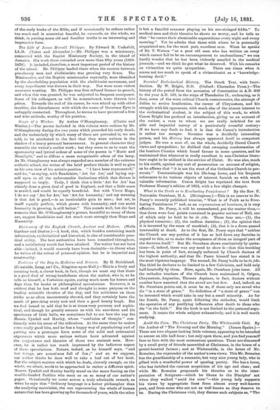Socrates' Ecclesiastical History. The Greek Text, with Intrc- duction. By
W. Bright, D.D. (Oxford : Clarendon Press.)—The history of the period from the accession of Constantine in A.D. 306 to the year A.D. 439, in the reign of Theodosius II., embracing, as it does, some of the most critical Church controversies, the attempt of Julian to revive heathenism, the career of Chrysostom, and his struggle with his opponents, with much else of the utmost interest to the ecclesiastical student, is the subject of this work, to which Canon Bright has prefixed an introduction, giving us an account of the author, a man to whom we are really indebted for an able and impartial survey of a particularly eventful century. If we have any fault to find, it is that the Canon's introduction is rather too meagre. Socrates was a decidedly interesting person, and his History has always approved itself to competent judges. He was a man of, on the whole, decidedly liberal Church views and sympathies; he disliked that sweeping condemnation of the heathen Classics which found favour in some quarters, and he maintained that whatever is really excellent in non-Christian litera- ture ought to be utilised in the service of Christ. He was also, mach to his credit, against any sort of persecution on account of religion, as he affirms that. "it is not the wont of the Orthodox Church to per- secute." Constantinople was his life-long home, and his frequent references to its various objects of interest furnish us with much valuable information. Canon Bright has reprinted the text from Professor Hussey's edition of 1853, with a few slight changes.


































 Previous page
Previous page